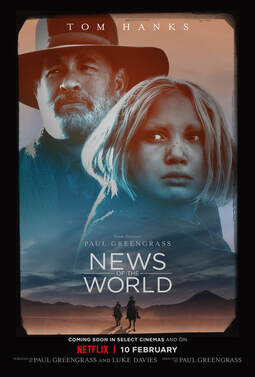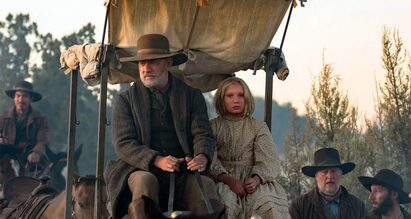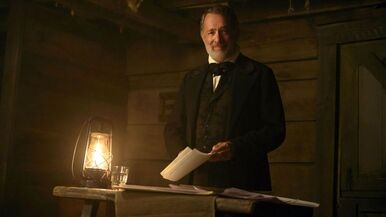
Please note: The following text contains spoilers. Viewer discretion is also advised – News of The World is rated ‘12’. For more details on the film’s content from a Christian perspective, read Focus on The Family’s review from Plugged In:
https://www.pluggedin.com/movie-reviews/news-of-the-world-2020/
Captain Kidd (Tom Hanks): “Good evening. My name is Captain Jefferson Kyle Kidd, and it is an honour to be back in the bustling city of Dallas. A busy town, and y’all are busy folk, so let’s get right to it. Now, when I got in yesterday, I collected the latest newspapers, looking for suitable readings, something to take us away from our troubles…”
In a recent interview for the Directors Guild of America, directors Paul Greengrass (the Bourne series) and John Madden spent time discussing Paul’s latest film, News of The World – a distinctly classical Western in the John Ford style, but also one of genuine, contemporary resonance for today’s world. In essence, however, this is a relatively simple tale in which a lonely orator named Captain Kidd (Tom Hanks), travels from town to town reading the news of current affairs in 1870’s Texas, in the aftermath of the American Civil War.
In the aforementioned podcast, Paul explains that Hanks’ character journeys across a harsh, “broken landscape”, marred by the effects of “bitterness and division”, “violence and anger”, but comes to find that his “stories connect people” – even in the face of cholera outbreaks, or the threat of violence erupting between former confederates and unionists. In escaping trouble on more than one occasion, it almost seems as if Kidd was specially appointed and granted protection for this difficult, largely unrewarding task – but one which frequently brings “good news to the poor” and a sense of “liberty” to “those who are oppressed” (Luke 4:18, NLT), within the towns that he visits. Perhaps the film should be retitled then, as: “Vital News for The People of The World” …?
“Now, I know how life is in these parts, working a trade sunup to sundown. No time for reading newspapers. Am I correct? Let me do that work for you. And maybe, just for tonight, we can escape our troubles, and hear of the great changes that are happening out there.”
Whilst watching this opening scene, it became apparent to me that Kidd’s traveling newscast somewhat resembled a church service – in terms of space and general focus. It featured a stage (an altar, if you will), seating, a pot for the ‘offering’ and the delivery of a message which Kidd believes will bring hope to the weary souls of a small town who feel cut off from the rest of the world – a service not delivered solely for profit then, but because he wants to help them escape their present troubles. And such a comparison is not ill-founded, as Kidd later delivers the news inside of an actual church, from behind the pulpit itself. In that instance, certain items of news bring grumbling from amongst the confederate patrons, who then seek to blame such bad news upon the unionist soldiers from within their region. Later, news of a railroad brings much rejoicing. But when Kidd speaks on the subject of federal news, tensions quickly flare and threaten to erupt into violence. Seeing an opportunity to prevent potential bloodshed, Kidd steps in to offer words of comfort, peace and empathy, that encourage unity and a turning away from unbridled anger. Their anger subsides, the patrons see the error of their ways, and peace is restored. Even in times of great difficulty, Kidd shares good news that encourages, challenges and subsequently changes people’s lives.
Some years before him, however, a Galilean travelled from region-to-region sharing arguably more encouraging and challenging Good News than even the great Captain Kidd ever could. Of course, His name was Jesus, and He was sharing news of eternal life that could be found in God alone – a message of greater importance than any local news, of course. But the comparison between both Kidd and Jesus stands – here are two individuals whose desire is to share news they know will bring respite to the poor and beaten down, but also restoration between people. For just as Kidd is accepting of and shows love for all people throughout the film, so too is Jesus. Jesus and the message He shared was and is for all people – no matter who they are, what they’ve done, or where they come from. Throughout the Gospel accounts, we constantly see this in Jesus’ behaviour towards others when He brought full healing to lepers (Mark 1:40-45), the blind (Matthew 20:29-34), the foreigner (Mark 7:24-30), and those who were possessed (Mark 5:1-20) – all of whom were treated as outcasts by society but found themselves consistently loved and welcomed in by Him. Through Jesus’ actions, people saw and learnt that there are to be no divisions amongst humanity, because we are all able to be united as one, in Christ – teachings which the early Church continued to honour, in St. Paul’s teaching from the Book of Galatians: “There is neither Jew nor Gentile, neither slave nor free, nor is there male and female, for you are all one in Christ Jesus.” (Galatians 3:28, NIV).
Whilst we see that Kidd’s intention is to encourage restoration and reconciliation between people, the Good News which Jesus carried with Him from town-to-town, was intended to bring about the even greater, more important hope of restoration between God and man. For just as there is a distinct separation between people in News of The World, as a result of civil war, humanity is separated from God because we have fought directly against Him. Each and every one of us, the Bible teaches, have done wrong in the eyes of God and have thereby ‘sinned’ against Him, which separates us from relationship with God now and in eternity, for there is a price we must pay for our mistakes. (Romans 3:23 & 6:23). As a result of humanity’s own selfish pursuits, rejection of God and so much more, “no one is (able to be called) righteous — not even one” (Romans 3:10, NLT). Humanity cannot therefore be in friendship with the living God on earth now, or in Heaven – for He is pure, and we are impure. Even in our attempts to appease God by showing him our “righteous deeds”, He considers them to be nothing more than filthy rags before Him (Isaiah 64:6, NLT).
There is, however, Good News in Christ Jesus. How do we know this? Well, the Good News that Jesus carried with Him, delivering it so frequently and urgently, was simple, direct and vital: “The Kingdom of God is near! Repent of your sins and believe the Good News!” (Mark 1:15, NLT). Jesus maintained all throughout His ministry that humanity was in need of reconciliation with God, because our relationship with Him was broken apart by our sin. In our sinful state, we were “His enemies” (Romans 5:10, NLT), but God made a way for perfect reconciliation to be achieved. The Bible tells us when Jesus went to death on the Roman cross and rose again three days later, He paid the price for humanity’s sin – past, present and future – but also defeated the power that death has over humanity. Now, because of Jesus, “if we confess our sins to him, he is faithful and just to forgive us our sins and to cleanse us from all wickedness” (1 John 1:9, NLT), which results in the amazing gift of salvation - eternal life with God.
Whilst Kidd’s news and encouragements are positive, often bringing about a sense of peace and joy (a way to “escape our troubles” he maintains), those feelings are momentary – frontier life still remains difficult for the characters of that film, and we still endure hardships even when we experience those feelings in our present reality. But the Good News of love, joy, hope, peace and reconciliation with God for all, found in Jesus, is in fact permanent. He brings all of that and more, for all of eternity, because of His great, powerful love for us. We might receive bad news in our day-to-day, but we can put our hope and trust in the One who is greater, because He offers us permanent Good News, every day.
Challenge:
Why not prayerfully invite a friend or family member who doesn’t yet know Jesus, to watch News of The World? Use the film’s themes to ask them what they thought of the film, if they spotted any links to Christianity and what they might think of the Gospel’s response to this subject.
If you feel able to, ask them what they think about the film’s view of sharing ‘restorative good news’ through Captain Kidd. Do they think that Kidd has an important role to play throughout his region? Or might Kidd be wasting his time? He seems to believe that he has the ability to encourage reconciliation between the people around him, but do they think he makes a genuine difference in the places that he visits? Ask them what they thought of Kidd’s dedication to sharing the news from town-to-town, even if the salary is pitiful and the journeys are long – have they ever felt compelled to share some good news they received, because they thought it would encourage others?
Later prompt them to consider their own lives, by asking them what was the best news that they ever received and why. Did the excitement surrounding the good news linger for a while, or did it run out eventually? If so, why? Go on to share that the Good News of Jesus Christ is a constant source of peace, love, joy and hope. It’s news that we can put our trust in, for it will never let us down or disappoint us. Take the opportunity to share the hope of the Gospel message with them – noting that God has given us this Good News, because He so desperately wants for us to be restored to life-giving relationship with Him.
Prior to watching the film for yourself, however, take a moment to pray that God would speak to you through the film. If you feel comfortable, pray this prayer over all of your future, film-watching experiences:
Dear Lord, as I watch this film, I ask that you would be present here with me. Highlight to me anything within it that is honourable, anything that can be used in conversation for your Kingdom purposes. Amen.
News of The World is currently available to stream on Netflix (U.K.)



 RSS Feed
RSS Feed